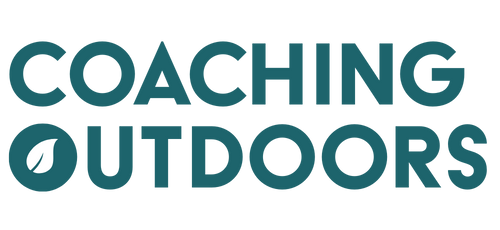Nature as Co-Facilitator
One difference between coaching indoors and outdoors is that the outdoors has an endless capacity to surprise us. Its joys are unscripted, its discoveries your own. When outdoors, nature is truly an active participant in the coaching relationship. Working with nature as a co-facilitator is about consciously inviting her in – all being in the relationship together. It is a relationship that taps into our evolutionary heritage (Wilson, 1984) concerning our connection with the non-human animate world surrounding us.
Consider the excerpts below from a Guardian article about Forest School by Liz Lightfoot:
“Being sat around a fire, being fully immersed in whittling a spoon, erecting a shelter or seeing a pupil in a new light can all fuel romantic thinking about alternative approaches to education,” she says. “You see children building a shelter with tarpaulins, sticks and ropes or making face paint out of nettles and some making bracelets out of saplings. It’s so calm. It’s magical.”
On the other hand, she knows of sessions where what goes on inside is brought outside: “I’ve seen written work from the classroom brought outside with worksheets and, on one occasion, desks as well,” she says. “That is not forest school, nor is it when the children come out to find laminated posters stuck to trees with number challenges and marker pens.” (25th Jun 2019).
It’s a great parallel for the difference between taking a coaching session outside and working with nature as a co-facilitator. Bringing the school worksheet or coaching conversation outside takes the learning into a nicer environment and of course there are many benefits of being outdoors so it’s not to be knocked. However, the experience of activeyly engaging with nature offers richness, depth, new perspectives and ‘magic’.
When we coach outdoors, we may have the same conversation that we would have had in the office but more noticeably at a slower pace and often with a very different client outlook. Or, you can invite nature into the coaching conversation, expanding the process and opening the door to additional dimensions, unlocking things which would perhaps not have been reached without nature’s active presence. A very simple example; offering a client a moment of reflection while looking at a beautiful view, you could even walk on a small way, leaving them with some space allowing nature to positively support their meaningful reflection. The physical container for the coaching session is now a vibrant, dynamic and living process, brimming with vitality offering a rich intelligence to the work.
By inviting nature to deepen our coaching conversations the results can be powerful. During one team event in Devon, I invited each team member to walk for 10 minutes and to pick up something they were drawn to and bring it back. We sat in a clearing in the woods while they shared; what they had collected, what drew them to it and in what way they felt it was relevant to them. The level of the conversation and the connection that was built between the team was far beyond the normal ‘icebreaker’ activity!
Berger (2009) describes a triangular relationship between the therapist, client and nature. The therapist can act as a shamanic guide or take a minor role, allowing greater dialogue between nature and client. He details how direct sensory contact with natural elements can be a powerful stimulus to deeper thoughts and feelings. In particular, it can benefit clients who have difficulty with connecting to emotions or being able to express themselves.
Nature is a living, sensual place, evoking work that involves all the senses and communication channels; physical, emotional, imaginative and spiritual (Abram, 1996; Roszak, 2001). Working with nature as a partner in coaching can be transformational for coach and client.
If you’d like to experience more insights to support you in your coaching outdoors work take a look at Getting Started Coaching Outdoors and Nature as Co-facilitator. We’d love to see you on our programmes.
Lesley
Lesley holds an MSc in Executive Coaching from Ashridge Business school, is an EMCC Master Practitioner and she has 16 years commercial experience with Mars Inc. Read More >
She is the author of ‘Coaching Outdoors; the essential guide to partnering with nature in your coaching conversations’.
Contact by calling +44 (0) 7799 581792 or email info@coachingoutdoors.com.




